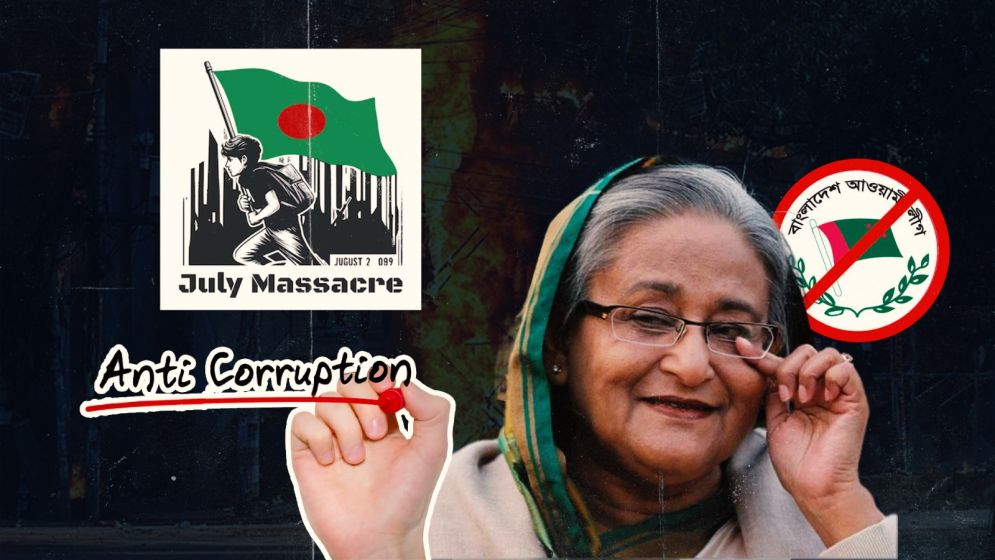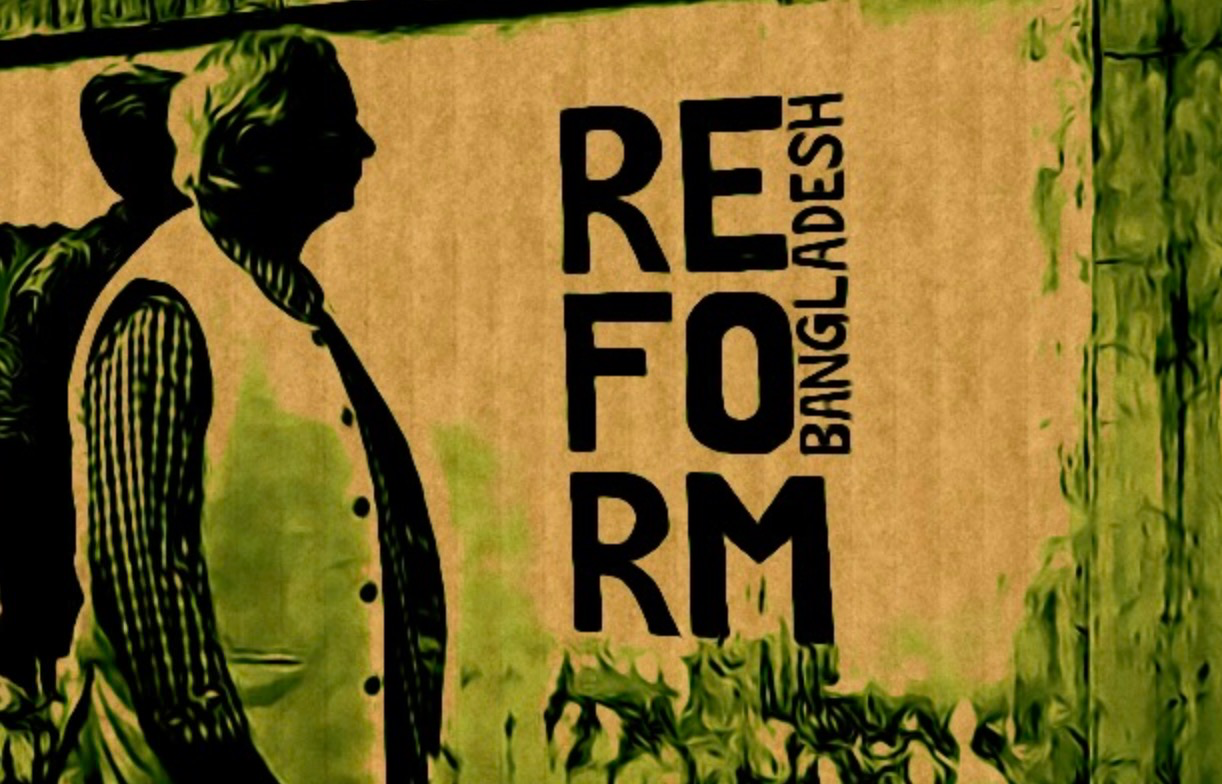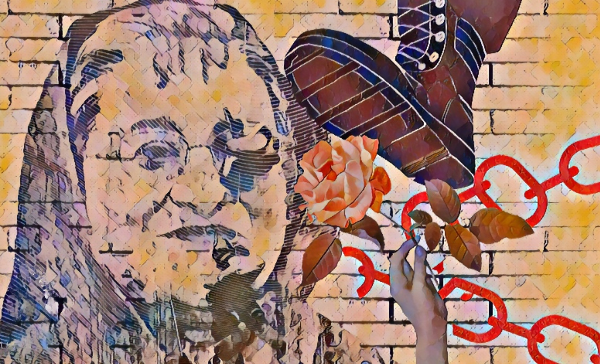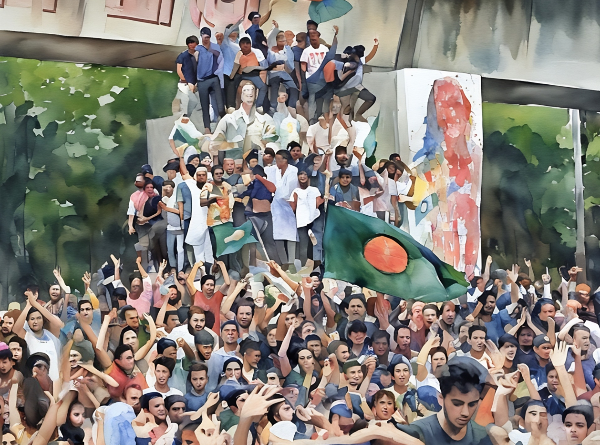Banning the Awami League may have killed the disease….or the cure

During last year’s monsoon, Bangladesh watched its streets transform into battlegrounds.
Students led the charge, and the nation followed. What began as a protest over quotas became something else entirely–a rebellion against a ruling party that had long overstayed its welcome.
By August 5, the Awami League government was gone. Its leader, Sheikh Hasina, fled the country, abandoning thousands of party loyalists to face the fallout of a regime’s collapse.
The fall of the Awami League was a storm long forecasted, fueled by years of mismanagement, arrogance, and a state machinery that grew increasingly indifferent to suffering.
But the ban that followed this week? That was not part of the original script.
The uprising was broad-based–students, teachers, workers, the jobless, even those once quietly loyal to the state. People had had enough. They saw their children–like Mugdho and Aby Sayeed–fall to government bullets.
Nearly 1,500 people killed, thousands injured. It was the deadliest civilian uprising since Bangladesh’s Liberation War. And it wasn’t just about blood anymore. It was about betrayal.
By the time Hasina disappeared from the scene, the moral authority of her government had collapsed completely. The Awami League was no longer seen as a party with history; it was seen as a party that had hijacked history.
Its downfall seemed less like a political shift and more like a societal cleansing.
But banning a party is not the same as toppling a government. The push to dissolve the AL altogether wasn’t born on the streets–it was born in backrooms. It wasn’t the students or the grieving families who called for it; it was the newly formed National Citizen Party (NCP), supported later by groups like Islami Chhatra Shibir and other ideological factions with long-standing axes to grind.
That matters. Because while the AL may have lost the public’s faith, banning it risks setting a precedent Bangladesh may regret.
The reaction online has been fierce, messy, and telling. Social media feeds are flooded with takes, most of them critical of the ban. Even those who cheered the fall of the Awami League are now wondering: does erasing a party erase the conditions that allowed it to rise in the first place?
A few defenders–mostly linked to the current administration–insist that the AL’s actions during the uprising disqualified it from ever returning to the political stage.
Maybe. But no one is seriously talking about what this ban actually means, long-term, for democratic pluralism in Bangladesh.

What are the rationales behind the
ban?
We can argue about whether the AL deserved its downfall. Few would contest that it earned the fury it faced in July. But banning political opposition–even one as reviled as the AL had become–is not a sign of strength.
It is, historically, a move of fragile regimes trying to preempt their own demise.
What happens when you push an entire political machine underground? What happens when you feed its sense of martyrdom, its narrative of victimhood? We’ve seen this story before–in other countries, in other times. It rarely ends well.
This isn’t a defense of the Awami League. It’s a defense of the idea that even hated parties must be defeated at the ballot box, not buried by decree.
It will not be a faulty assumption if it is said that the NCP, still fresh out of the political womb, was staring down a giant. The Awami League may have been disgraced, its leader Sheikh Hasina exiled, but its roots in Bangladesh’s political soil run deep.
Banning the AL wasn’t about healing the nation. It was about clearing the field.
The NCP’s first fear? Facing the AL at the ballot box. Despite everything– the blood, the crackdown, the betrayal– the Awami League remained one of the country’s most enduring political machines.
Its electoral apparatus, patronage networks, and psychological hold on rural voters couldn’t be undone overnight. So rather than risk a democratic face-off, the NCP chose erasure.
Their second fear was more visceral: revenge. History offers a stark warning. The Awami League, after banning Jamaat-e-Islami, watched it claw its way back into the political mainstream.
The NCP knew that if the AL returned, they wouldn’t be coming back quietly. For NCP leaders like Nahid Islam and Hasnat Abdullah– who’ve seen how the AL brutally and mercilessly deals with dissent–the stakes weren’t just political. They were existential.
They feared a return of the Awami League meant disappearances, executions, obliteration. So they preempted it.
But no matter how justifiable that fear may seem, banning a political party– especially one with a legacy as complex and contested as the Awami League– is a dangerous game.
Because the AL didn’t emerge from a void. It was born in 1949 as a force against colonial exploitation. It fought for autonomy, and later, independence. It led to a war. It built a nation.
And then it broke it.

The decay of Awami League
Power, once acquired, changed the AL. The very party that fought for pluralism dismantled it.
Within years of independence, it banned all political parties and replaced parliamentary democracy with a one-party BAKSAL state– a local remix of Soviet authoritarianism.
Dissent was crushed. Critics were jailed. Opponents were hunted. In 1975, that authoritarian spiral ended in blood: Sheikh Mujibur Rahman, the founding leader of the party, was assassinated along with nearly his entire family.
Only Hasina and her sister survived–spared by distance, not mercy.
What followed was a 21-year vacuum, during which the Awami League barely clung to relevance. It returned to power in 1996 under Hasina, rebranded and more cautious. But the caution didn’t last.
In 2009, after securing a second term, the AL veered sharply off the democratic path again. It launched the controversial International Crimes Tribunal– ostensibly to try war criminals from 1971, but in practice, a purge of political opponents, especially Jamaat-e-Islami.
Never mind that Sheikh Mujib himself had pardoned the Pakistani officers and local collaborators decades earlier. Never mind that Jamaat had once been an ally. This was political expediency with the veneer of righteousness.
Meanwhile, the government wrapped itself in the banner of development. The Padma Bridge? A national symbol, sure– but at what cost? Timeframes stretched, budgets ballooned, and the burden fell squarely on the shoulders of ordinary Bangladeshis.
The Hasina government’s infrastructure binge–sprawling projects concentrated around Dhaka and Chattogram–was mostly about optics. Concrete and steel as spectacle.
The AL’s mistake wasn’t just misrule. It was believing it could hold power forever. The NCP’s mistake? Believing that banning a party solves the problems that created it.
The fact is, banning the Awami League won’t erase its legacy, nor will it prevent its return– in some form, through some channel. If anything, the ban may give the party the one thing it lacked at the end: the allure of victimhood.
Real democracy means defeating bad ideas with better ones, not suppressing them with legal decrees. The fall of a corrupt government is justice. The banning of a political party–no matter how flawed– is a warning. One that says the next government may be just as afraid of losing power as the last one was.
And that should worry all of us.

The real legacy of July
By the time Bangladesh erupted in protest in July 2024, the air had long been thick with fear and frustration. The state was no longer just dysfunctional–it was oppressive.
Press freedom had been reduced to a myth. The pillars of free expression and democratic dissent were crumbling beneath a government obsessed with loyalty to one family, one ideology, and one narrative: Bengali Nationalism, secularism, and above all, Mujibism.
Questioning the Sheikh family was taboo. Criticizing the government was dangerous. Asking for accountability? Virtually treasonous.
Under Sheikh Hasina, Bangladesh was not just governed–it was gripped. Elections were a charade, manipulated beyond recognition, allowing the Awami League to cling to power for three consecutive terms.
And with each term, Hasina’s rule grew more unbending, more autocratic, more brazen. What emerged was an absolutist state cloaked in the language of democracy.
The July uprising changed all that. Or so it seemed. Thousands rose. Blood was spilled. The people said “enough.” The fall of the Awami League was a collective exhale after years of suffocation.
But as I wrote earlier, the step to erase the AL was driven by fear–fear of political competition and fear of violent revenge. But let’s be clear: No matter how justified the outrage, banning the Awami League was not the will of the people. It was the will of a few.
And that matters–because if Bangladesh claims to be a democracy, then the fate of a major political party, even one as deeply flawed as the AL, should be decided at the ballot box, not through backdoor bans rubber-stamped by an interim administration.
The NCP demanded the ban. The interim government delivered it. But what happens next?
If the Awami League is driven underground–and history tells us it very well might be–who bears the responsibility when chaos erupts? Who will answer if AL loyalists turn to sabotage or violence, not out of ideology, but desperation?
Is the NCP ready to handle that? Is the interim government prepared for what it might have just unleashed?
That’s the part no one wants to talk about.
You don’t defeat authoritarianism by mimicking it. You don’t restore democracy by silencing your enemies. Banning the AL may feel like justice to some, but it is a shortcut that skips the hard work of building a political culture resilient enough to win debates, elections, and trust.
A real democracy defeats its worst ideas in the open–not by erasing them from the ledger.
If Hasina’s rule was defined by suppression, then the path forward must be defined by something radically different: openness, accountability, and the courage to let even the most hated parties face judgment at the polls.
Otherwise, we haven’t ended a dictatorship. We’ve just changed its name.
—
Muhammad A. Bashed is a Journalist based in Dhaka,

